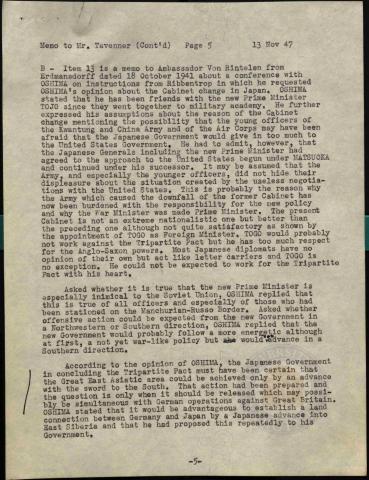
Page 5
| Parent | Examination of Documents Results November 13, 1947 |
|---|---|
| Date | 19 November 1947 |
| Language | English |
| Collection | Tavenner Papers & IMTFE Official Records |
| Box | Box 6 |
| Folder | General Reports and Memoranda from November 1947 |
| Repository | University of Virginia Law Library |
Memo to Mr. Tavenner (Cont'd) Page 5 13 November 1947
B - Item 13 is a memo to Ambassador Von Rintelen from Erdmansdorff dated 18 October 1941 about a conference with OSHIMA on instructions from Ribbentrop in which he requested OSHIMA's opinion about the Cabinet change in Japan. OSHIMA stated that he has been friends with the new Prime Minister TOJO since they went together to military academy. He further expressed his assumptions about the reason of the Cabinet change mentioning the possibility that the young officers of the Kwantung and China Army and of the Air Corps may have been afraid that the Japanese Government would give in too much to the United States Government. He had to admit, however, that the Japanese Generals including the new Prime Minister had agreed to the approach to the United States begun under MATSUOKA and continued under his successor. It may be assumed that the Army, and especially the younger officers, did not hide their displeasure about the situation created by the useless negotia¬tions with the United States. This is probably the reason why the Army which caused the downfall of the former Cabinet has now been burdened with the responsibility for the new policy and why the Far Minister was made Prime Minister. The present Cabinet is not an extreme nationalistic one but better than the preceding one although not quite satisfactory as shown by the appointment of TOGO as Foreign Minister. TOGO would probably not work against the Tripartite Pact but he has too much respect for the Anglo-Saxon powers. Most Japanese diplomats have no opinion of their own but act like letter carriers and TOGO is no exception. He could not be expected to work for the Tripartite Pact with his heart.
Asked whether it is true that the new Prime Minister is especially inimical to the Soviet Union, OSHIMA replied that this is true of all officers and especially of those who had been stationed on the Manchurian_Russo Border. Asked whether offensive action could be expected from the new Government in a Northwestern or Southern direction, OSHIMA replied that the new Government would probably follow a more energetic although at first, a not yet war-like policy but would Advance in a Southern direction.
According to the opinion of OSHIMA, the Japanese Government in concluding the Tripartite Pact must have been certain that the Great East Asiatic area could be achieved only by an advance with the sword to the South. That action had been prepared and the question is only when it should be released which may possi¬bly be simultaneous with German operations against Great Britain, OSHIMA stated that it would be advantageous to establish a land connection between Germany and Japan by a Japanese advance into East Siberia and that he had proposed this repeatedly to his Government.
-5-
